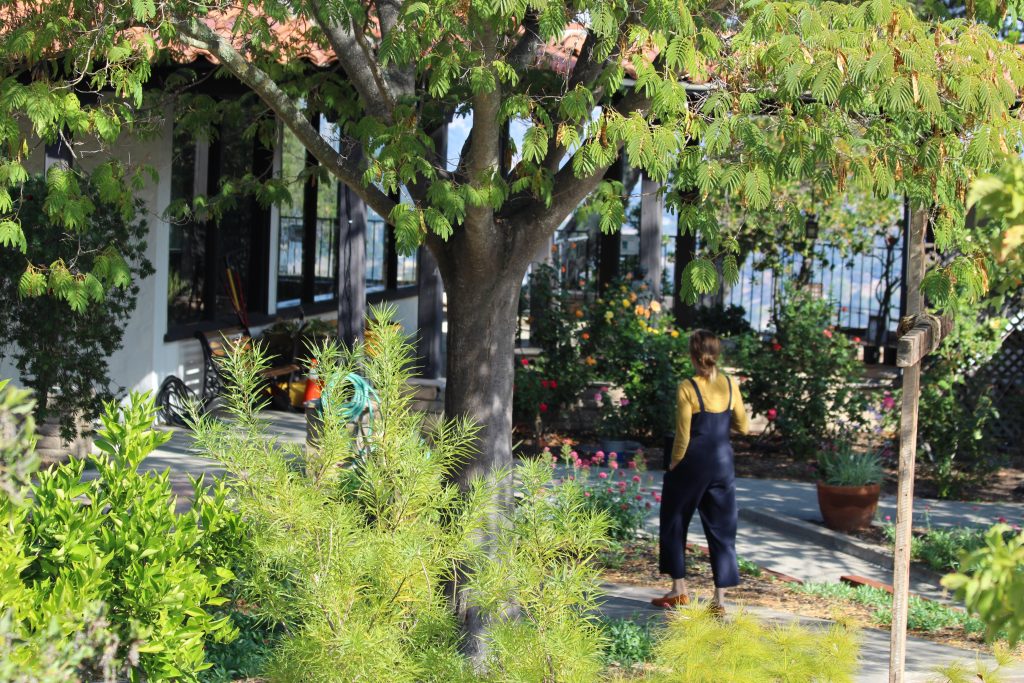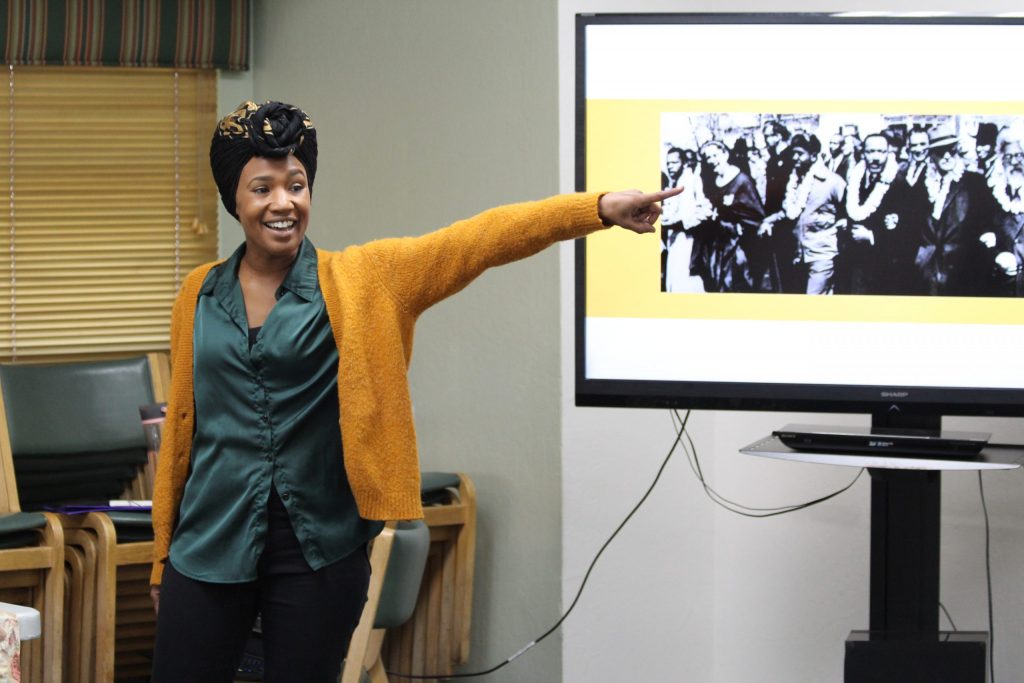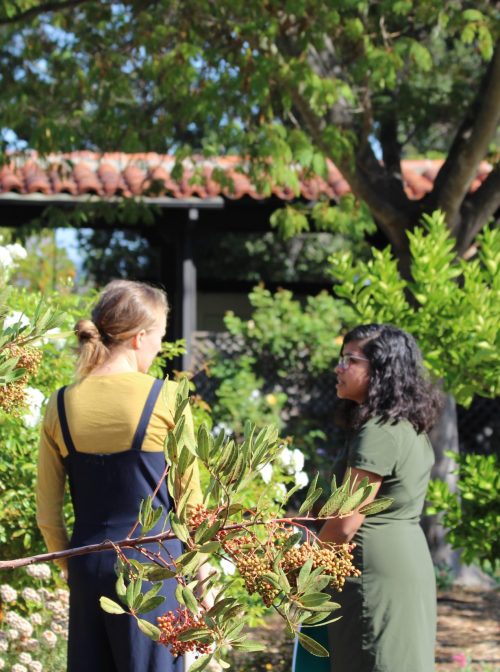I could feel the blustery wind on my cheeks as I stepped foot onto the oak tree covered grounds of the Catholic retreat center in Northern California. It was 7:45 AM, cloudy, overcast, and the parking lot was already full, bursting with folks attending retreats and gatherings that had already begun. I paused to take a deep breath, grateful to be here and for what the day ahead would bring.
My friend Laura met me in front of our retreat room. Laura is a contemplative Christian nurse and I am a Hindu/Buddhist pediatrician; we’ve been friends for many years. Through our interfaith, interdisciplinary friendship, we founded Introspective Spaces, an organization dedicated to building reflective space for women in healthcare. As an organization borne out of the pandemic, our work felt like it was taking a whole new meaning as we set up for our first ever in person gathering. We walked around the room together, trying to bring in small moments of contemplative inspiration from the activists, scholars, theologians who inspired us —hanging up quotes from Tricia Hersey from the Nap Ministry to activist and organizer adrienne maree brown to poet Joy Harjo. We created our altar space that would become the central location for our opening and closing rituals.
Moments before it began, we took a few minutes to check in with our breath, to remind ourselves of what it took to be here today and all the people we would keep in our hearts throughout the day.

Our retreat focused on the core themes of rest, reflection and connection, principles we both value from our respective faith traditions. We chose to hold our retreat at the San Damiano Franciscan retreat center to both utilize the beautiful retreat grounds and to support a retreat center that was open and affirming to interfaith communities. Our group of participants cut across many identities and healthcare hierarchies, bringing together family medicine residents, pediatricians, therapists, nurses, and our friend and mentor Jasmine Whaley, a community organizer. We began our day with somatic exercises, focused on reconnecting with our bodies. Taking inspiration from the Quaker Hands Up and Hands Down prayer, we asked participants to begin by placing their hands down on their laps, to let go of all the thoughts and criticisms that prevent us from being fully present. We then opened our palms to invite in our intentions, writing them down on pieces of paper we kept at the altar.
We took time to introduce ourselves through a creative practice — introductory haikus — to rejoice in the discomfort and play of being multifaceted entities. My Haiku was more facetious than I intended, perhaps a little too reflective of the internal dialogue I hold secretly when I inevitably hear that I am fighting for and dreaming of unrealistic things in healthcare:
“They told me I had a
bleeding heart, to them I say
At least I can feel”

Jasmine kicked off our day with a Story of Self workshop, using core principles from community organizing to teach us how to unpack elements of white supremacy culture that didn’t serve us. Through modeling her own story, and the inspiration she took from interfaith activism in the civil rights movement, she showed us how to identify crossroads in our life where we were forced to confront our values. It was beautiful to watch participants reflect on their values and try to weave them into a cohesive story of self. Some were surprised by the story they would end up sharing with their partner — often a story that they hadn’t realized was on their mind.
The morning transitioned into opportunities for solitude and contemplative practice. We provided a series of different practices to try, ranging from expressive writing to Buddhist meditation to centering prayer. Participants had opportunities to walk the beautiful grounds of the San Damiano center, reflect by the Stations of the Cross in the oak tree grove or take a meditative walk through a labyrinth. After time in solitude, we gathered for a communal lunch with other groups using the retreat center that day, from Jewish congregations to Catholic sisters. We were in community with so many other contemplative and spiritual practitioners, all simultaneously gathered in a natural spot dedicated to rest and restoration.
We began our afternoon by jumping back into creative exercise through intuitive collage. We spread out pictures from magazines: words, backgrounds, landscapes (pictures Laura and I had frantically cut out the night before) and asked folks to create a collage that reflected how they presented on the outside and what they carried inside. It was joyous to see this group of diverse women engaging in creative practice — allowing for a sense of play and silliness that is not a luxury we can afford in our clinical jobs. In this moment of pause, I kept thinking of the patients and families I cared for in the neonatal intensive care unit who were living in the liminal space of uncertainty and hope each day. As I took time to leaf through images, I thought of one of my patients, a preterm infant who still required a breathing tube to breathe and the emotional turmoil that his family was navigating. This creative practice gave me a chance to send thoughts of love and hope to this family, not as a doctor but as a fellow human, and to express through images the grief I could not express in words. The end result of this collage activity was the opportunity to tell stories of the multitudes we all carry within us that we don’t often have the words to describe. We shared our stories with each other, offering a chance to engage in generous listening in the same way we often hold stories for others in our lives.
As our day was winding down, we offered more time for contemplative practice before coming together for one final exercise — a reflection on values. We chose this exercise to build our community capacity to support each other. In moments of moral distress, when we feel that we know the right action but are unable to engage in it (often due to structural reasons in our workplaces), clarifying our values can help us articulate where our moral distress comes from. It may not lead to immediate change, but it can help us speak with more clarity, to ourselves and others, about what causes us distress in our healthcare settings. I reflected on how one of my core values —generosity — can feel at odds in a health system that is stuck in a cycle of scarcity. To bring a spirit of generosity I need to consciously decide each day to be willing to engage in a practice that is not the norm. It requires significant introspective work. This exercise was ultimately a starting point for this discussion as we reflected on the values that brought us to healthcare, the values we hold now and the ones we seek to embody.
As we set up for our closing ritual, we gathered once again in a circle, just as we began. We closed with an act of community care, writing a blessing on a flower petal for each participant to create a “bouquet of blessing.” We then read these blessings to each other, reminding each other that we are here to hold and love one another.
As I reflect on this day and the immense gratitude we felt as event hosts, I come back to the haiku I wrote at the beginning of our day. I was grateful for the opportunity to pause and feel. To create spaces for our feelings, for authentic relationships, care and support is what it means to engage in community care. It can feel like a immensely different approach than the one we experience in our healthcare system. Yet, it is only through this radical act of caring for ourselves and each other that we can better engage in our work with presence and compassion and be a part of reimagining a more compassionate and equitable healthcare system.
Anu Gorukanti, MD (she/hers) is a public health practitioner, pediatric hospitalist, and co-founder of Introspective Spaces, a social venture committed to building reflective space and community for women in healthcare. She is also a member of the Sacred Journeys and Witness fellowships. She cares deeply about the well-being of her colleagues in healthcare and is passionate about healthcare reform to create equitable and compassionate care for patients and communities. In her free time, she loves to photograph landscapes, learn to dance and spend time with her wonderful husband, friends and family.




